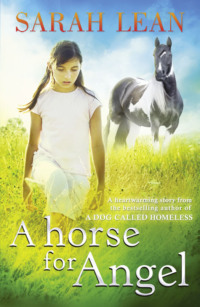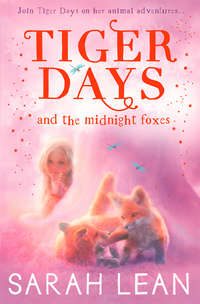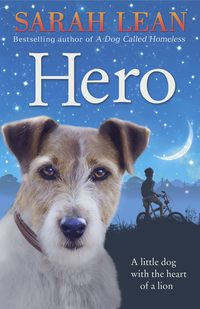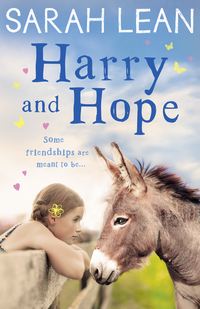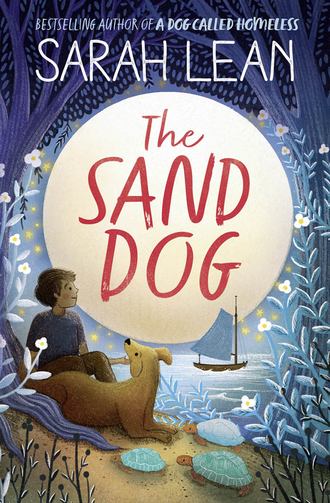
Полная версия
The Sand Dog


First published in Great Britain by HarperCollins Children’s Books in 2018
Published in this ebook edition in 2018
HarperCollins Children’s Books is a division of HarperCollinsPublishers Ltd,
HarperCollins Publishers
1 London Bridge Street
London SE1 9GF
The HarperCollins Children’s Books website address is
www.harpercollins.co.uk
Text copyright © Sarah Lean 2018
Cover design copyright © HarperCollins Children’s Books 2018
Cover design by Katie Everson
Cover illustrations copyright © Jessica Courtney-Tickle
Sarah Lean asserts the moral right to be identified as the author of this work.
A catalogue record for this book is available from the British Library.
All rights reserved under International and Pan-American Copyright Conventions. By payment of the required fees, you have been granted the non-exclusive, non-transferable right to access and read the text of this ebook onscreen. No part of this text may be reproduced, transmitted, downloaded, decompiled, reverse engineered, or stored in or introduced into any information storage and retrieval system, in any form or by any means, whether electronic or mechanical, now known or hereinafter invented, without the express written permission of HarperCollins.
Source ISBN: 9780008165819
Ebook Edition © June 2018 ISBN: 9780008165826
Version: 2018-05-04
For my nephew Seb (lead guitar – Chapman’s Farm, vintage, Pops) Granville
Contents
Cover
Title Page
Copyright
Dedication
Chapter 1
Chapter 2
Chapter 3
Chapter 4
Chapter 5
Chapter 6
Chapter 7
Chapter 8
Chapter 9
Chapter 10
Chapter 11
Chapter 12
Chapter 13
Chapter 14
Chapter 15
Chapter 16
Chapter 17
Chapter 18
Chapter 19
Chapter 20
Chapter 21
Chapter 22
Chapter 23
Chapter 24
Chapter 25
Chapter 26
Acknowledgements
Keep Reading …
About the Author
Books by Sarah Lean
About the Publisher
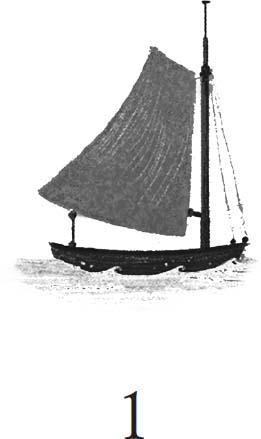
I NEVER THOUGHT GRANDFATHER would come back on an ordinary day like a Monday or a Tuesday. He’d come on the kind of day when the rising sun is pouring its colours on the sea because there’s not enough room for all its glory in the sky. Grandfather was like that kind of special day to me too. He was a fisherman, and from watching the drift of deep-water seaweed he could land a net of fish full to bursting. He knew the journey of a past storm by what swept up on the beach, and could tell a thousand stories of extraordinary creatures from the deep. He said that the ocean had a long story to tell about all of us, full of signs of things that have happened and signs of things that are to come. I always knew he’d come back across the sea, triumphing over a few monsters on the way, but I was still waiting after two years for that special day to arrive.
I live on a small island in the Mediterranean. My home used to be with Grandfather in a little fisherman’s cottage but now I’m in a flat with Uncle above his restaurant at the back of the beach. My open bedroom window is like an ear to the sounds of the water, and it was one Friday night that I heard the rhythm of the tide change.
In my underpants, I went downstairs and walked across the beach to look out over the waves. The sea was black as simmering tar, and the moon reflected like broken glass on the restless waves. At the far end of the beach on the shallow rocks that divided the beach from the cove further along, a turtle was struggling hard to climb out of the water. Her shell was patterned like the crazy paving of our narrow streets, and I wondered what it felt like to carry her home on her back.
The turtle was clumsy on the rocks without the support of the water, and tumbled on her back to the sandy cove. I ran over. Turtles aren’t good on land anyway, but her front flipper was caught in some fishing line round her neck like a sling, making it hard for her to move at all. I recognised the chip in her shell from when she’d been to our island two years ago. I wondered if she remembered me, because she didn’t seem afraid when I rolled her over. She was heavy, and as big as a shield, but I was strong and cut her free from the line. She lumbered off, digging grooves in the sand with her flippers, leaving a rippled pattern beside my footprints. Slowly she made her way to the back of the cove where she dug a cool hole, laid her eggs and buried them deep in the dark, just as she had before. I stayed with her until she was ready to go back to the sea, as the sun rose pink and gold behind a thin bank of cloud at dawn.
Grandfather had taught me that the sea could tell me a story. I needed three signs to let me know that he was coming home. The turtle had been the same one I’d seen the day before he left. Could that be the first sign?
I swam and dived with the turtle in the growing day, in the place where she was at ease, where I felt at home too, until I heard Uncle shouting from the rocks, ‘Azi! Get out of the sea! It’s almost eight o’clock!’
I surfed in with a wave and followed Uncle up to the restaurant where he was already laying tables ready for the early tourists.
‘Hurry up, or you’ll be late,’ he said. ‘And don’t forget your jobs after school!’ he yelled, as I leaped up the stairs to the flat, two at a time, to get dressed.
I pulled on a T-shirt and flip-flops and I ran, feet flapping, all the way to school, my wet underpants seeping through my shorts. It was already hot and I hoped they’d dry out before I got there. I’d got used to people calling me names like sea boy and water boy, saying the sea had weed on me, but I didn’t care today. It was the last day of term, a special and good day to feel that Grandfather was coming home at last. Three whole months of holiday lay ahead of us – enough time for Grandfather to see the turtle eggs hatch with me.
After school finished, Dimi, Chris and three other children asked me to play basketball with them.
‘Come on, just this once, Azi,’ Chris said. ‘We need enough players for two teams.’
I shrugged. ‘I’m going to the beach. I want to swim.’
‘You’re always going to the beach,’ Dimi moaned. ‘You can go anytime.’
We’d been stuck like this for a while now – them asking me to play basketball, me asking them to come swimming – none of us wanting to do what the other wanted. The last couple of years as we’d been growing up, we had grown apart.
‘You’re a weird creature from the sea, Azi!’ Chris shouted. ‘And you don’t even belong here!’ He slammed down the ball as I ran, trying not to listen to what he had said and to what people always told me, my flip-flops slapping on the tarmac that had gone sticky in the heat.
I swam, looking for the turtle, but she had gone, so I went to Uncle’s restaurant to talk to him about it. The restaurant was busy, the tables on the deck almost full of customers, white tablecloths swaying under the shade of the vines overhead.
In the kitchen, Uncle’s face was red and sweaty from the ovens and the scorching day.
‘The turtle came back,’ I said. ‘Do you remember the one that came the day before Grandfather left?’
Uncle frowned but didn’t answer. He was trying to take an order ticket from Maria the waitress, but she held on to it, her other hand on her hip, nodding her head towards me, waiting for Uncle to answer me first.
‘It must be a sign that he’s coming home. Have you heard from him?’ I said.
‘Two calamari!’ Uncle yelled to the other staff bustling and sweating around him as he tried to read the ticket between Maria’s fingers.
‘Azi is trying to speak to you,’ Maria said.
‘Two Greek salads!’ Uncle yelled, snapping the ticket from Maria. She clicked her tongue on her teeth because he was yelling, even though he didn’t need to, but she wasn’t ever bothered by his loud presence and the fact that he was the boss. ‘I don’t know anything about turtles,’ Uncle said more quietly and turned away from me to toss fish in a frying pan.
‘What’s the turtle got to do with Grandfather, Azi?’ Maria said, filling in for Uncle.
‘Grandfather taught me to read the signs from the sea,’ I explained. ‘Things that wash up on the sand can tell you a kind of story.’
Maria raised her eyebrows. ‘Is the turtle the same kind of sign as those big seashells you found on the beach? Or those waves breaking out like seahorses, and all the other signs you keep telling me about?’
I’d said the same kind of thing before, but this time it was different. This time I was sure it meant Grandfather was coming back. ‘Grandfather told me turtles are messengers,’ I said, hoping she’d understand.
At that moment, Uncle yelled across the kitchen. ‘How many times have I told you all of Grandfather’s talk was nonsense? And unless you’re bringing me a turtle to make soup, Azi, out of my kitchen and go get me some more customers!’
Although I was used to Uncle yelling a lot of the time over pots and pans (and I knew he didn’t really mean that he’d cook the turtle), you could hear the uncomfortable silence among the rest of the staff behind all the clanking and sizzling and chopping. Maria shook her head at Uncle, pursing her lips.
It wasn’t the right time to talk to Uncle. The restaurant was quite full, but not as full as Uncle would have liked it, and that made him crabby. He relied on having lots of customers in the summer to keep the bills paid throughout the quiet winter. I collected the flyers that I usually handed out to people who came off the ferries at the quay and was about to leave when Maria called after me, her foot holding the swinging door open.
‘Uncle yells at everyone, you know that, don’t you?’ she said. ‘It’s just a lot of hot air.’
‘Grandfather used to say that if all of Uncle’s yelling didn’t come out, it would boil and boil up inside him and then one day he’d go kaboom!’ I said.
‘Wouldn’t be good for business if Uncle went kaboom, hey, Azi?’ Maria laughed. ‘Grandfather made sense to you, didn’t he?’
I nodded. ‘We’re two of a kind, me and him. Two creatures from the sea.’
‘And what’s the message the turtle has brought you?’ she said.
‘People send messages to say they’re coming, don’t they?’
Maria smiled. ‘Yes, they usually do.’ She reached out and tugged at the end of my hair lying on my shoulders. ‘When are you going to let me cut your hair?’
‘When Grandfather comes back,’ I said, running off.
At the quay, I called out to the tourists as they stepped off the ferries that brought them from the other islands.
‘Come to Uncle’s restaurant on the beach! Fresh fish. Hot chips and ketchup. Cold beer,’ I told them, and handed out flyers, sticking some in the side pockets of suitcases as they were wheeled past. But most of the time I was checking to see if an old man in a blue cap would appear. When the ferries were finally emptied Grandfather hadn’t come, so I headed off, not really sure when to expect him.
I went back to the cove and staked a fence made of driftwood sticks and chicken wire round the area where the turtle eggs were hidden. I stripped down to my shorts and swam, and from out in the water looked back to the land to see what the turtle must have seen when she’d found her way to the same nesting place. Except for that one time two years ago, we’d not had any other turtles nesting on our island before. Surely it couldn’t just be a coincidence that the turtle had come back now.
Uncle’s restaurant was only thirty running steps from the edge of the sea, but neither he nor Maria knew the sea like Grandfather and I did. I might have got it wrong before, but this time I was sure Grandfather was coming. The sea knew this story and it was telling me so.

THE SEA TAKES ITS own time to tell its story, Grandfather once told me. It was here long before we were and moved at its own pace and rhythm, not ours. Uncle was too busy in the restaurant over the weekend for me to talk to him again about Grandfather but it didn’t stop me thinking about what had happened. Grandfather had left suddenly to go to London, Uncle had said, to sort out an old family problem. Grandfather hadn’t been born here but neither had he been born in England, so I was sure he couldn’t have family there. Why then had he never come back?
Uncle gave me lots of jobs to do over the weekend so it wasn’t until Monday that I could go down to the beach again. I was out swimming at the cove when I saw a strange shape and shadow in the water and before long a blue door came floating in on the tide. Was this another sign? It wasn’t the kind of thing you would normally find in the sea, but after the turtle had turned up I wasn’t sure what to expect. I swam out to meet the door and climbed onboard. Although the paint on it was crackled and flaked away, it was the same colour blue as the one on Grandfather’s cottage.
Grandfather had lost his fishing boat a while before he left, so it was nice to feel what it was like to have something solid to float on again. There was a hole in the door where the letter box used to be and I looked down through it at the shadow it made on the seabed. Then I dived under and looked up through the opening, blowing bubbles through the hole before climbing back up and lying on it, face down, like a wide surfboard. I paddled around for a while and then took it to shore. It was already so hot in June that you had to hop across the sand. I dug away to get to the cooler, damp sand underneath and then propped the door up with some rocks and sheltered in its shade, looking out across the water for the afternoon ferries. When I saw the first big white-and-yellow ferry in the distance I knew it was time to go down to the quay and hand out more flyers, and while I was waiting I noticed something on the rocks out of the corner of my eye.
I squinted in the light until I could just make out that it was a dog. How long must he have been sitting there? He was looking out to sea, his narrow nose up in the air in a kind of proud way. He sometimes glanced over at me but when I looked at him he would look away. Then when I looked away he would shuffle a bit closer. I guessed he must want some shade because the sand was oven-hot, so I moved over and soon he came and sat next to me under the shadow of the door. He was almost as tall as I was sitting down, long and lean, with wispy fur the colour of sand. He didn’t do anything else but watch with his nose up while his ears drooped down. I wondered for a minute if he could be the third sign, but I decided he couldn’t be because he hadn’t actually come from the sea.
‘What are you waiting for?’ I said to him.
The dog’s eyes twitched towards me for a moment, but looking out over the waves was all he seemed to want to do, and we sat there for a long time, just like that, until the yellow-and-white ferry turned into the quay.
‘Gotta go,’ I said to the dog. ‘You can sit here, if you want, and keep watch for me.’ The dog looked up. ‘I’m waiting for another sign.’
At the quay, crowds of passengers disembarked.
‘Come to Uncle’s. Best restaurant on the beach,’ I said. ‘Calamari and chips. Ice-cold beer.’
I didn’t think Grandfather would really come on a Monday but you never knew, so I was still keeping an eye out for a short white-haired old man with muscular shoulders and arms, because that door was definitely telling me something. Maybe it meant that a letter from Grandfather had come! I headed into the village.
At the post office hardly anyone was queuing. I looked through the doorway to see who was inside and nearly stopped myself from going in to speak to Mrs Halimeda because she was an impatient kind of person. But when everyone else had gone I took my chance, and stepped up to the counter.
Mrs Halimeda sighed. ‘What is it this time, Azi?’
I folded one of the spare flyers, pushing it under the glass partition. ‘I couldn’t remember whether you’d seen Uncle’s new menu,’ I said.
She took it, unfolded it, and sighed again. ‘It’s exactly the same as the one you gave me last time you came in,’ she said, pushing it back through the window.
I rolled and unrolled the paper in my fingers before finally saying what I was really there for. ‘I wondered if there was a letter for me today?’
Mrs Halimeda narrowed her eyes. ‘As I’ve told you every week now for a very long time, if we did it would be delivered to your uncle’s address like everything else is. And before you ask again, yes, we know where you live.’
I felt uncomfortable that I always seemed to annoy her but I wanted to be sure she hadn’t missed anything.
‘I found a door and I think it’s a sign that something’s been sent to me, you see,’ I said.
Mrs Halimeda shook her head and looked over my shoulder as the queue began to grow behind me.
‘What about a postcard?’ I asked.
‘No postcards,’ she said, stern and as unmoved as a stone wall. ‘Next!’
When I moved away I heard her saying ‘Hopeless boy!’ and the lady from the Turkish Baths replying, ‘Well, you only have to look at who raised him.’
It burned inside and made me angry that they’d say something like that about me and Grandfather. But when people had called me names, or when they had looked at me as if I didn’t belong here, Grandfather would say, ‘They don’t know you at all, not like I do.’
And they didn’t know Grandfather like I did either.
When I went outside I found the dog from the cove was sitting beside the door. He put his nose in the air, looking away at first then looking back at me. Maybe his owner was in the post office.
Having no luck, I went back to the cove to check the turtle nest was safe from anybody disturbing it. As I was sitting there, digging away at my own hole in the sand with a stick to see how much work the mother turtle had to do to make her nest, a cool shadow fell across me, blocking the sun. It was the dog again, up on the rocks making shade for me. He climbed down and sat next to me again, looking out to sea.
‘Do you like it here too?’ I said.
He turned his head to look at me. His eyes were warm earth brown.
‘Nobody can bother you here. There’s just the whole wide sea … and us.’
The dog looked away when I didn’t say any more.
I wrapped my arms round my shins, rubbing at the scar on my knee, and rested my chin there as I thought about Grandfather. Would he be coming on a ferry? Or would he have bought himself a new boat?
I remembered once when Grandfather and I had found broken wooden boxes scattered along the tideline of the cove. Then, a few days later, whole crates were washed up, and he said I had to wait and see what else came floating in. After about two weeks and loads of my guesses about what it might be (none of which were right), hundreds of pineapples had been washed up on the beach. The pineapples had come out of the boxes and must have fallen off a ship, but, because the boxes and pineapples were different shapes and weights and sizes, it had taken them different lengths of time to arrive. I’m not saying that Grandfather was a pineapple, and I definitely couldn’t read the sea as well as he could, but it did mean that different things came at different times.
The dog sighed.
‘Be patient, you’ve only been sitting here for one day,’ I said. ‘I’ve been waiting for two years for Grandfather to come home.’
We stayed like that again for a long, longing time.

THE NEXT MORNING, BEFORE Uncle was up, I stuffed some cold chicken and salad in pitta bread for breakfast and went down to the cove. The dog was already there, lying under the propped-up old door. His eyes and eyebrows twitched as he looked up at me but he didn’t lift his head. I sat beside him and picked out the cucumber and tomatoes to eat them first. The dog sat up and was trying really hard not to look at me eating the rest.
‘You must have got up early too so you’re probably hungry,’ I said, giving him a bit of chicken that he swallowed without chewing. It was nice having him beside me, even though he didn’t say or do much; in fact, that was what I liked about him first of all. I liked that he’d sit there quietly with me looking out to sea. It was what Grandfather used to do.
‘Stay there,’ I told the dog. ‘I’m going to get you something else.’
I ran back to Uncle’s restaurant and found the old tin bucket out the back. Then I went to the kitchens and checked on the shelves in the fridge for plates covered in foil with leftovers from the restaurant. I piled food into the bucket, shut the fridge door and then found Uncle standing there.
‘Who’s all that food for?’ he asked.
I wasn’t sure what Uncle would say if he knew I was taking food for a dog. Sometimes there were strays around the restaurant – dogs that people brought on the ferries and left behind, sometimes on purpose, sometimes by mistake. Uncle said the strays put customers off, and the staff knew better than to feed them and chased them away. He probably wouldn’t take kindly to the fact that I was encouraging one of them to hang about.
‘It’s all for me,’ I said. ‘I’m hungry.’
‘Good,’ he said, opening the fridge door to start preparing food. ‘You need feeding up.’
It was a quiet moment without hot voices and burning ovens and the first time I’d had a chance to be with Uncle without him yelling for people to get a move on and take orders, clear tables or hurry up with those chips. This was my opportunity.
‘Has Grandfather written to you to say which day he’s coming back?’ I asked.
Uncle had the same irritated look as Mrs Halimeda did when I kept asking the same question.
‘No, he hasn’t,’ he said.
‘Only I thought that if he’s coming home soon, maybe I should go over to his cottage and put some food in the fridge, ready for when he comes back.’
Uncle put a plate down harder on the counter than he needed to and his voice grew like popcorn. I blinked as he told me, ‘How many times have I said that you’re not to go over there? You live here with me now, and that’s that!’
I’d got used to Uncle’s yelling and Mrs Halimeda’s impatience and Chris and Dimi’s mickey-taking but it was getting harder and harder to accept that this was how things had to be. Even though they all repeated the same things to me again and again, it wasn’t what I wanted to hear. I belonged with Grandfather at his cottage, and while he wasn’t here I felt like a bucketful of water that had been taken from the sea and left behind on the beach when the sun went down and everyone else had gone home. When you can’t be with the person you need to be with all that you are left with is the longing to go back.


